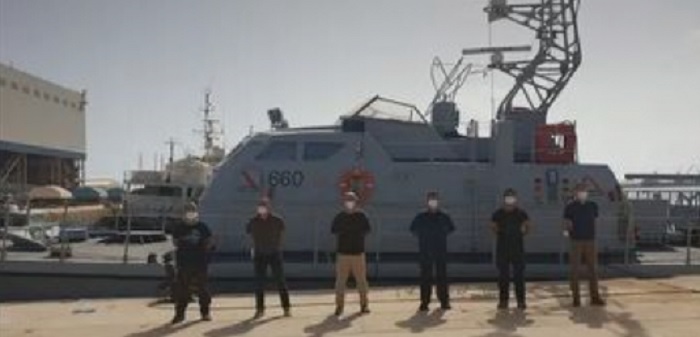
Turkish armed forces have started training the Libyan coast guard, learned BulgarianMilitary.com citing reports of the Italian newspaper La Repubblica. The newspaper rates this as a “further blow” against Rome’s influence on the LibyanGovernment of National Accord [GNA] in Tripoli, as this activity has so far been carried out by the Italian military mission.
The Ubari 660 patrol boat of the Libyan coast guard can be seen in photos taken by the Defense Ministry in Ankara, which show the Turkish instructors or military advisers. It is one of two boats used for training. According to the Italian newspaper, the patrol boat was donated to the GNA in 2018 by the Italian government.
The newspaper report expresses fears that have been circulating for a long time – that the Turkish government is in the process of “influencing the control of the flows of migrants” trying to reach Europe via the central Mediterranean route. “The initiative is likely to have a significant impact on the situation in the Strait of Sicily.”
This is happening gradually. The first operations by Turkish marines on the side of the Libyan coast guard took place in January. Turkey is “increasingly able to decide whether to stop the boats or let them leave”. So far, however, it is not known what control the Turkish military representatives actually exercise over the coast guard in Libya. There are no reports yet. It is clear that the military clout of the Libyan unity government is completely dependent on Turkish support. The influence from Ankara is correspondingly great.
Earlier this year it was reported that a Turkish frigate had “picked up” or “rescued” 30 migrants on a boat in the Mediterranean Sea, depending on the portrayal, and handed them over to the Libyan Coast Guard, who brought them back to Libya. The NGO Sea-Watch assessed this as “involvement in a serious human rights violation”.
According to the Turkish Defense Ministry, the training of the Libyan coast guard is part of the memorandum of understanding [MoU] on military cooperation [“training, cooperation and advice”] that it concluded with the GNA last year. Last Monday, the GNA Defense Minister, Mohammad Al-Haddad, who was only appointed in August, visited the Turkish Defense Minister Hulusi Akar and his Chief of Staff to discuss further cooperation.
EU: 60 million euros for “Libyan border management”
Turkey’s influence, not least in the case of the Libyan coast guard, means competition not only for Italy, but also for the EU. The EU has provided around 60 million euros for the Libyan border management. A large part of the money goes to support the coast guard – via the Libyan General Administration for Coastal Security [Gacs] – as the publication EU Observer reports today.
There, based on an internal EU report, it is reported that the training of members of the Gacs, including personnel on ships of the coast guard, to safeguard human rights, control and liability is only making “poor progress”. It is still open whether this will be improved by the Turkish instructors.
In the end, the EU Observer report points to links of the Libyan coast guard that are not very glorious. The arrest of Abd al-Rahman Milad is reported. Milad is a notorious smuggler with notoriously brutal methods – at the same time he commanded the Libyan coast guard at Zawiya. The UN Security Council had put him on a sanctions list two years ago [UN sanctions against masterminds in the smuggling business].
It is difficult to determine what role militia leaders and smugglers currently play in the Libyan coast guard; media reports mostly highlight the good connections between coast guard crews and militias that oversee the camps into which captured migrants are brought.
The fact that the Libyan coast guard is still intertwined with militias and is at least partially very militant was shown in November last year when the German public prosecutor’s office investigated “armed Libyan militias” that had attacked the German rescue ship Alan Kurdi with firearms during an operation . “The Libyan Coast Guard” is divided, as the Telepolis report pointed out, into “two authorities with overlapping functions”:
“The Department of Interior Police Coast Guard is a law enforcement agency that operates within the twelve-mile zone and along the coast. The Department of Defense Coast Guard is responsible for territorial waters.”
How the cooperation between the Turkish military and the Libyan coast guard is designed remains to be seen. In the La Repubblica report mentioned, the training provided by the Turkish military advisors is described as a further signal of provocation for the Italian Libya policy:
“It is no coincidence: Erdogan’s soldiers in North Africa have adopted an evocative symbol. It reproduces a famous photo of the young Ataturk, the father of modern Turkey, with a pipe in hand while leading the resistance against the Italians in 1911. In some The coat of arms that is worn over the uniforms today is the Turkish name of the Libyan province at the time with the year “1910”, ie before the beginning of the Savoyard colonial adventure. Everything under one sentence from Ataturk himself: ‘Soldiers, your first goal is the Mediterranean. Forward!”
Turkey wanted to disrupt relations between Italy and Libya, so the gist of the message. Among Libya experts who discuss the news on the social networks, however, it is also suggested that Italy and Turkey can come to common positions.
Both support the GNA unity government and the government in Rome yesterday received the reinstated Interior Minister Fathj Bashaga, who is an important contact person for Turkey. He was fired a few weeks ago by GNA boss Sarradsch. The Turkish government had made a significant contribution to his reinstatement, it was said later.
Turkey begins training Libyan coastguards and thus competes with the EU and Italy
